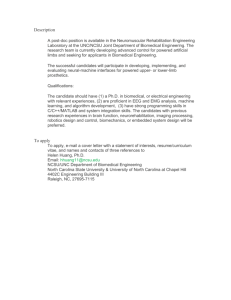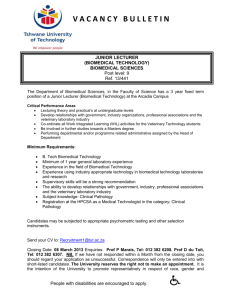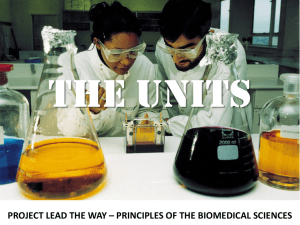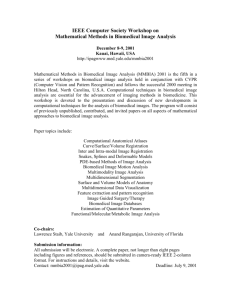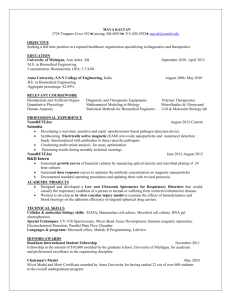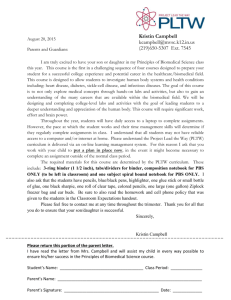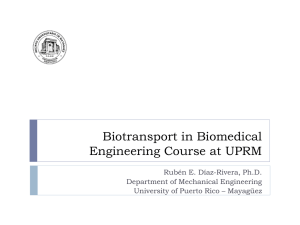UTSW Graduate School Catalog: Biomedical Engineering
advertisement
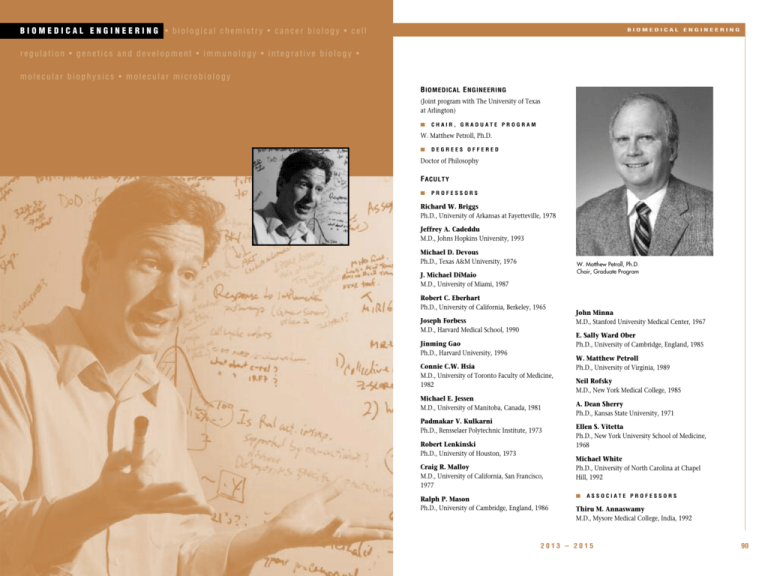
B I O M E D I C A L E N G I N E E R I N G • biological chemistry • cancer biology • cell BIOMEDICAL ENGINEERING regulation • genetics and development • immunology • integrative biology • molecular biophysics • molecular microbiology B IOMEDICAL E NGINEERING (Joint program with The University of Texas at Arlington) ■ CHAIR, GRADUATE PROGRAM W. Matthew Petroll, Ph.D. ■ DEGREES OFFERED Doctor of Philosophy F ACULTY ■ PROFESSORS Richard W. Briggs Ph.D., University of Arkansas at Fayetteville, 1978 Jeffrey A. Cadeddu M.D., Johns Hopkins University, 1993 Michael D. Devous Ph.D., Texas A&M University, 1976 W. Matthew Petroll, Ph.D. Chair, Graduate Program J. Michael DiMaio M.D., University of Miami, 1987 Robert C. Eberhart Ph.D., University of California, Berkeley, 1965 Joseph Forbess M.D., Harvard Medical School, 1990 John Minna M.D., Stanford University Medical Center, 1967 E. Sally Ward Ober Ph.D., University of Cambridge, England, 1985 Jinming Gao Ph.D., Harvard University, 1996 Connie C.W. Hsia M.D., University of Toronto Faculty of Medicine, 1982 Michael E. Jessen M.D., University of Manitoba, Canada, 1981 Padmakar V. Kulkarni Ph.D., Rensselaer Polytechnic Institute, 1973 Robert Lenkinski Ph.D., University of Houston, 1973 Craig R. Malloy M.D., University of California, San Francisco, 1977 Ralph P. Mason Ph.D., University of Cambridge, England, 1986 W. Matthew Petroll Ph.D., University of Virginia, 1989 Neil Rofsky M.D., New York Medical College, 1985 A. Dean Sherry Ph.D., Kansas State University, 1971 Ellen S. Vitetta Ph.D., New York University School of Medicine, 1968 Michael White Ph.D., University of North Carolina at Chapel Hill, 1992 ■ ASSOCIATE PROFESSORS Thiru M. Annaswamy M.D., Mysore Medical College, India, 1992 2013 – 2015 90 UT SOUTHWESTERN GRADUATE SCHOOL A. Jeff Browning M.D., UT Southwestern Medical Center, 1998 Shawn C. Burgess Ph.D., UT Dallas, 1997 BIOMEDICAL ■ SCIENCES ENGINEERING ASSISTANT PROFESSORS Christopher Chen Ph.D., University of Wisconsin, Madison, 1996 Sergey Cheshkov Ph.D., UT Austin, 2001 Changho Choi Ph.D., Korea University, 1989 Ian R. Corbin Ph.D., M.Sc., University of Manitoba, 2002 Rajiv Chopra Ph.D., University of Toronto, Canada, 2002 Nick V. Grishin Ph.D., UT Southwestern Medical Center, 1998 Daniel Costa M.D., Faculdade de Medicina da Universidade de Sao Paulo, 2001 Hao Huang Ph.D., Johns Hopkins University, 2005 Nitin J. Karandikar M.D., University of Pune, India, 1990; Ph.D., Northwestern University, 1997 Wen-Hong Li Ph.D., University of California, San Diego, 1996 Hanzhang Lu Ph.D., Johns Hopkins University, 2004 Qiu-Xing Jiang Ph.D., Yale University, 2002 Kevin S. King M.D., Harvard Medical School, 2005 Roderick W. McColl Ph.D., University of Warwick, England, 1992 Zoltan Kovacs Ph.D., Lajos Kossuth University, Debrecen, Hungary, 1992 Alan Nugent M.D., University of Melbourne, 1991 Matthew A. Lewis Ph.D., UT Southwestern Medical Center, 2002 Orhan K. Oz M.D., Ph.D., Stanford University, 1991 Ananth Madhuranthakam Ph.D., Mayo Graduate School, 2005 Ivan Pedrosa M.D., Universidad Complutense de Madrid, 1994 Weihua Mao Ph.D., Peking University, China, 1999 Fangyu Peng M.D., Ph.D., Jiangxi Medical College, 1982 Matthew Merritt Ph.D., Washington University, 1996 Scott Smith Ph.D., University of North Texas Health Science Center, 1999 Karen Pawlowski Ph.D., UT Dallas, 2000 Xiankai Sun Ph.D., University of New Hampshire, 2000 BIOMEDICAL Jonathan Cheng M.D., Baylor College of Medicine, 2000 Roger Chan Ph.D., University of Iowa, 1988 91 OF Matthias Peltz M.D., UT Southwestern Medical Center, 1999 Masaya Takahashi Ph.D., Hokkaido University, Japan, 1996 Jimin Ren Ph.D., Chinese Academy of Sciences Changchun Institute, 1991 Dawen Zhao M.D., Ph.D., University of Tsukuba, 1998 D. Gomika Udugamasooriya Ph.D., Wayne State University, 2006 2013 – 2015 Elena Vinogradov Ph.D., Weizmann Institute of Science, Israel, 2003 Cuneyt Yilmaz Ph.D., Southern Methodist University, 2000 Takeshi Yokoo M.D., Ph.D., Mount Sinai School of Medicine, 2005 O BJECTIVES B iomedical Engineering (BME) is an interdisciplinary science that employs engineering methods and approaches to define and solve biological problems. The UT Southwestern Medical Center BME Program has an emphasis on the development of advanced procedures and technologies that facilitate both basic biomedical research and the detection, diagnosis, and treatment of disease and disability. Biomedical Engineering is part of a joint graduate program between UT Southwestern and UT Arlington. In addition, the Program has close ties with The University of Texas at Dallas, as well as a number of high-tech industries in the DallasFort Worth area. Thus the Program offers a robust set of resources for biomedical research and education. The Biomedical Engineering Program has more than 40 faculty members from both basic science and clinical departments at UT Southwestern, whose research covers a broad range of fundamental and applied bioengineering research. The BME Program promotes a collaborative, multidisciplinary environment, with a focus on providing the highest-quality education and training for our students. The UT Southwestern BME Program features three research and teaching tracks: Biomedical and Molecular Imaging Biomaterials and Tissue Engineering Biomolecular and Protein Engineering The BME Program also supports and promotes research in Bioinstrumentation and Medical Devices through its collaborations with UT Arlington, UT Dallas, and other academic and industry partners. F ACILITIES W ell-equipped research laboratories are available, reflecting the interests of the Biomedical Engineering faculty at UT Southwestern, UT Arlington, and other affiliated institutions. Classrooms and graduate student office space exist on both campuses. 2013 – 2015 92 UT SOUTHWESTERN GRADUATE SCHOOL The Division of Biostatistics in the Department of Clinical Sciences at UT Southwestern supports interactive clinical information systems and realtime central laboratory automation. There are numerous laboratory computer work stations and computer classrooms available for student research and training at UTSW and UT Arlington. R EQUIREMENTS FOR A DMISSION A lthough students officially are enrolled at both institutions, application should be made to only one institution, chosen in accordance with individual preferences. This institution will be the applicant’s “home” institution. UT Southwestern Graduate School of Biomedical Sciences participates in Cooperative Degree Programs with UT Arlington. Acceptance into a Cooperative Program is conditioned upon the understanding that institutional sponsorship of the Program may change during the period of matriculation. If the sponsorship changes and the student’s home institution is not then the sponsoring institution, this may subject the student to different policies and procedures. In addition, the identity of the institution or institutions officially granting the degree upon successful completion of the Program will depend upon official sponsorship of the Program at that time. Applicants for advanced degrees in Biomedical Engineering should have an undergraduate gradepoint average of at least 3.0 in engineering, bioengineering, or an allied discipline. While it is expected that most applicants will have an engineering background, applicants from other disciplines may be admitted but must remedy deficiencies in course work while meeting the degree requirements. All students studying for a Ph.D. receive a nationally competitive research assistantship of $28,000 per year throughout the course of their Ph.D. studies. Additional funds provided to the student cover the full cost of tuition, a comprehensive health insurance package, and student service fees. 93 OF BIOMEDICAL SCIENCES C URRICULUM T he Joint Graduate Program in Biomedical Engineering offers three primary research and teaching tracks: Biomedical and Molecular Imaging, Biomolecular and Protein Engineering, and Biomaterials and Tissue Engineering. Because of the interdisciplinary nature of the Program, students may take courses at both UT Southwestern and UT Arlington. The courses listed in the Biomedical Engineering section of the catalog represent only a portion of the many courses available to students. BIOMEDICAL campuses. Appropriate sections of this catalog and the catalog of UT Arlington should be consulted. The graduate adviser should be contacted for additional course offerings. ■ UTSW COURSES 5101 BIOMEDICAL ENGINEERING SEMINAR The various topics covered in this course are in multiple formats ranging from lectures by faculty or guest speakers to presentations by participating students. It is required for all students. 5300, 5301, 5302 SPECIAL TOPICS IN BIOMEDICAL ENGINEERING D OCTORAL D EGREE P h.D. students are required to complete a minimum of 24 hours of advanced coursework, which includes track-specific engineering and life science courses. In addition, students attend the weekly biomedical engineering seminar series (given by faculty), and a biweekly journal club/works in progress course in which students have the opportunity to present and discuss their own research. First-year students complete a core curriculum that includes track-specific core courses, three or four laboratory rotations, and training in the responsible conduct of research. All doctoral students must pass three examinations (I, II, and III). Exam I (6194) is a diagnostic exam, usually given following completion of the first year. It consists of a written examination, based on a broad problem in the area of the student’s research track, and an oral examination to defend the written one. The oral exam also may cover areas of perceived weakness in the student’s background. Exam II (6195) is for admission to candidacy for a Ph.D. It consists of a detailed written prospectus of the proposed dissertation research (6397, 6697, or 6997) and an oral examination. Exam III (6399, 6699, or 6999) is the final oral defense of the completed dissertation. C OURSE D ESCRIPTIONS T he following courses represent only a portion of the relevant courses available on both 2013 – 2015 Advanced studies in topics related to biomedical engineering, such as principles of animal surgery, molecular imaging, and nuclear magnetic resonance instrumentation, are offered in this course. This course is given as an organized class or an independent study, as circumstances warrant. Prerequisite: Program approval. Course may be repeated for credit when topics vary. 5306 BIOCHEMISTRY Fundamental aspects of human biochemistry are introduced in this class. Topics may include structure and intermediary metabolism of carbohydrates, fats, proteins, nucleic acids, vitamins, and minerals. 5307 HUMAN ANATOMY LECTURE This course offers the lecture portion of a comprehensive study of the structure and function of human body systems and their mechanisms. Emphasis is placed on the major characteristics of each body system and on its function and relationship to other body systems. 5308 HUMAN ANATOMY LABORATORY This course offers the dissection laboratory portion of a comprehensive study of the structure and function of human body systems and their mechanisms. Prerequisite: 5307 Human Anatomy Lecture ENGINEERING 5331 POLYMERS IN BIOMEDICAL ENGINEERING This is a foundation course in polymeric biomaterial design, synthesis, characterization, and processing. The topics include design, surface engineering, functionalization, characterization, as well as micro- and nano-fabrication of polymeric biomaterials. The biomedical applications of the polymeric biomaterials and their interactions with cell/tissue are discussed. 5360 DESIGN AND APPLICATION OF ARTIFICIAL ORGANS This course offers instruction on the fundamental principles of fluid mechanics, mass transfer, and chemical reaction in engineered biological systems. Simple solutions are developed for the design of artificial hearts, lungs, and kidneys. Examples are given of applications in clinical situations and evaluations of system performance. 5361 BIOMATERIALS AND BLOOD COMPATIBILITY This course is an introduction to polymer structure and fabrication methods. Blood and tissue interactions with materials and methods to improve biocompatibility of materials are discussed. 5362 THERMOREGULATION AND BIOHEAT TRANSFER This course focuses on the application of engineering analysis to problems in physiological and clinical heat transfer. Hyperthermia (including laser, electromagnetic, and ultrasound heating of tissue), hypothermia (including circulatory arrest and tissue freezing) and other applications are analyzed. 5363 DIGITAL PROCESSING OF MEDICAL IMAGES The instrumentation and techniques for creation of digital medical images (radiographs, scintigrams, ultrasound scans, magnetic resonance scans, and tomographic reconstructions) and their restoration, enhancement, and compression are treated in this course. Other topics of interest, including segmentation, representation, and description, may be discussed. 5309 HUMAN PHYSIOLOGY This course offers a comprehensive study of the basic physiological principles dealing with body systems and their interrelationships. 5370 BIOMATERIALS-LIVING SYSTEMS INTERACTION This course describes current developments in molecular structure and organization at synthetic 2013 – 2015 94 UT SOUTHWESTERN GRADUATE SCHOOL material interfaces and the subsequent influences on cells and cell membranes. It is designed to lay the groundwork for an improved understanding of events at the biomaterial-living system interface. 5191, 5291, 5391 RESEARCH IN BIOMEDICAL ENGINEERING (THESIS OR THESISSUBSTITUTION) This course is open to students who are qualified to pursue thesis or thesis-substitution research or other supervised investigations. 5398, 5698, 5998 M.S. THESIS RESEARCH AND DEFENSE 5293 M.S. COMPREHENSIVE EXAMINATION (THESIS-SUBSTITUTION OPTION) This course includes instruction, directed study, and examination of course work leading to the thesis-substitution M.S. degree in Biomedical Engineering. It is required for all thesissubstitution M.S. students. OF BIOMEDICAL SCIENCES 6195 DOCTORAL RESEARCH PROPOSAL EXAMINATION (EXAM II) This course offers individual instruction, directed study, consultation, and examination of the written dissertation research proposal. It is required for all doctoral students. Prerequisite: Passage of 6194 Doctoral Diagnostic Examination (Exam I) 6395 INDUSTRY INTERNSHIP IN BIOMEDICAL ENGINEERING The student works 20 hours per week in a Dallas/ Fort Worth-area firm to gain experience in the application of biomedical engineering principles in an industrial setting. Topics may vary. Students are encouraged to take the engineering certification (EIT) exam upon completion of the internship. Prerequisites: Completion of all master’s degree course work and approval of the graduate adviser. 6397, 6697, 6997 DOCTORAL RESEARCH IN BIOMEDICAL ENGINEERING 5371 BASIC PRINCIPLES OF NMR SPECTROSCOPY The fundamental concepts of NMR will be introduced using a quantum mechanical description. Topics include excitation and detection, relaxation, shaped pulses, double resonance experiments, and dynamic nuclear polarization. Approved research projects leading to a doctoral dissertation. 6399, 6699, 6999 DISSERTATION PREPARATION AND DEFENSE (EXAM III) This course is the defense of the completed doctoral dissertation. Doctoral students must 5372 INTRODUCTION TO BIOMEDICAL AND MOLECULAR IMAGING The course offers an introduction of multimodality imaging of molecular events of living organism. Prerequisite: Biology and Biochemistry 6103 DOCTORAL STUDENT SEMINAR IN BIOMEDICAL ENGINEERING This course offers advanced topics in biomedical engineering. It is required for doctoral students and must be completed twice. BIOMEDICAL register for this course in the term of graduation. Prerequisite: Passage of 6195 Doctoral Research Proposal Examination (Exam II) ■ UT ARLINGTON COURSES 5335A BIOLOGICAL MATERIALS, MECHANICS, AND PROCESSES This course offers a study of typical, functional behavior of various biological materials, flow properties of blood, bioviscoelastic fluids and solids, and mass transfer in biological systems. 5340A FINITE ELEMENT APPLICATIONS IN BIOENGINEERING This course describes the fundamental principles of the finite element method and various numerical modeling techniques. Topics include variational and Galerkin formulations, linear and Hermitian elements, accuracy, and convergence. Applications in biological systems and the design of prosthetic devices are emphasized. Topic areas include linear elasticity, fluid dynamics, heat transfer, and mass transport processes. 5344A BIOINSTRUMENTATION I This course presents fundamental principles of bioinstrumentation, including operational amplifiers and instrumentation amplifiers; measurements of biopotentials; signals and noise in biological systems; mechanical transducers; resistive, inductive, and capacitive tranducers; measurements of temperature, blood pressure, and flow; and electrical safety. 5345A BIOSENSORS AND APPLICATIONS This course presents fundamental principles of biosensors, including electrochemical and fiberoptic sensors. Topics include introduction to fabrication, miniaturization techniques, and discussion of future directions, including semiconductor fabrication and nanofabrication technology. ENGINEERING 5350A MODELING AND CONTROL OF BIOLOGICAL SYSTEMS This course is an introduction to fundamental methods of modeling, analysis, and control of biological systems; linear system modeling; statespace modeling; stability analysis; and basic identification techniques. Examples from cardiopulmonary, visual, and motor-control systems are given. 5351A DIGITAL CONTROL OF BIOMEDICAL SYSTEMS This course offers students information on design and control strategies for microprocessor-based medical equipment, discrete and sampled data systems, Z transform, digital control design methods, stability considerations, and closed-loop system response. 5382A LABORATORY PRINCIPLES This course is an introduction to fundamental biomedical-engineering laboratory procedures, including human and animal studies. Data collection, analysis, and interpretation are emphasized. Prerequisite: Permission of instructor. 5396A DIRECTED LABORATORY PROJECT Students participate in assigned projects in areas appropriate to their research and degree plans under the direction of their mentors. 6390A, 6690A, OR 6990A HOSPITAL INTERNSHIP FOR BIOMEDICAL ENGINEERS Students will intern at local hospitals under the individual supervision of the course instructor and a hospital staff member. During the term, each student rotates through areas such as cardiac, pulmonary, prosthetics, neurosurgery, anesthesiology, radiology, catheterization, and emergency care. Prerequisites: BME 5309 and permission of instructor. 6194 DOCTORAL DIAGNOSTIC EXAMINATION (EXAM I) This course offers individual instruction, directed study, consultation, and examination. It is required for all doctoral students. 95 2013 – 2015 2013 – 2015 96
